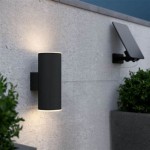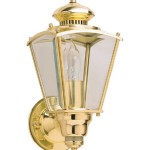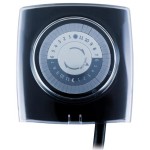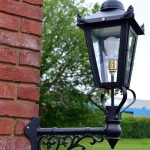What is a Photo Sensor for Outdoor Lights?
A photo sensor, also known as a light sensor or photocell, is a device that detects the presence of light and converts it into an electrical signal. Its primary purpose in outdoor lighting is to switch lights on automatically when it gets dark and off when it gets bright. This feature provides convenience and energy efficiency by eliminating the need for manual operation.
Components and Functionality of a Photo Sensor
A photo sensor typically consists of a photosensitive element (such as a photodiode or phototransistor) and a comparator circuit. The photosensitive element generates an electrical current proportional to the intensity of light it receives. The comparator circuit then compares this current with a reference voltage to determine if it is light enough to turn on the light.
Types of Photo Sensors
There are various types of photo sensors available, each with its unique characteristics and applications. Common types include:
- Cadmium Sulfide (CdS) Photo Sensors: Inexpensive and widely used, they are sensitive to a broad range of light wavelengths and typically have a slow response time.
- Light-Dependent Resistors (LDRs): Also known as photoresistors, they exhibit a decrease in resistance when exposed to light and offer a straightforward and inexpensive solution.
- Silicon Photodiodes: Highly sensitive and durable, they provide a rapid response and are often used in precise light detection applications.
Factors to Consider When Selecting a Photo Sensor
When choosing a photo sensor for outdoor lighting, several factors should be considered:
- Sensitivity: Determines the minimum light level required to activate the sensor.
- Response Time: Indicates how quickly the sensor switches between on and off states.
- Spectral Range: Specifies the range of light wavelengths the sensor responds to.
- Environmental Considerations: Ensure the sensor can withstand outdoor conditions, including temperature fluctuations and moisture.
Benefits of Using Photo Sensors for Outdoor Lights
Photo sensors offer numerous advantages for outdoor lighting applications:
- Convenience: Automatic light operation eliminates the need for manual switching.
- Energy Efficiency: Lights are only turned on when necessary, reducing energy consumption.
- Enhanced Security: Automated lighting can provide a deterrent to potential intruders.
- Improved Aesthetics: Automatically illuminated outdoor areas create a welcoming and inviting atmosphere.
Conclusion
Photo sensors play a vital role in outdoor lighting by providing automatic light switching based on ambient light conditions. Their availability in various types and configurations allows for tailored solutions to meet specific lighting needs. By considering the factors discussed above, homeowners and lighting professionals can select the optimal photo sensor to enhance the convenience, energy efficiency, and safety of their outdoor lighting systems.

How To Add A Light Sensor Outdoor Lanterns The Navage Patch

Ip54 Outdoor Light Sensor Switch Photocontrol China Photocell Control Made In Com

Outdoor Light Intensity Sensor Ahkf

How To Add A Light Sensor Outdoor Lanterns The Navage Patch

Best Outdoor Motion Sensor Lights 2024 Security

Le Outdoor Dusk To Dawn Light Sensor Black Litecraft

Solus Photocell Light Sensor Switch For Hardwire Outdoor Lamp Posts With Ezee Change Plug Dusk To Dawn Control

Can You Add Motion Sensors To Existing Outdoor Lights Led Lighting Info

Auraglow Pir Motion Sensor Up Down Outdoor Wall Security Light Warminster Stainless Steel Led Lighting

Philips Hue Outdoor Motion Sensor Review Macrumors
Related Posts







